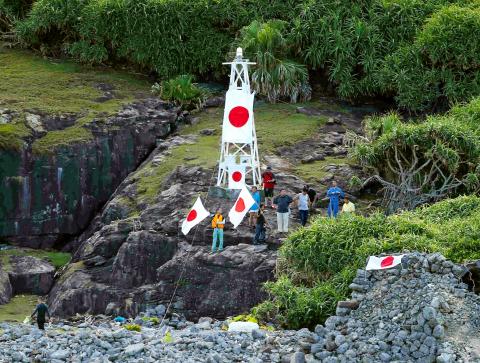|
Japanese raise flags
on Diaoyutais
STRONG PROTEST: The 150 right-wing Japanese
activists, including eight lawmakers, spent five hours near the islands in an
effort to stake their claim
AFP, SENKAKU ISLANDS, Japan

Japanese nationalists wave
Japan¡¦s national flag yesterday in front of a lighthouse on a disputed island
group known as the Diaoyutai Islands in Chinese and the Senkaku Islands in
Japanese.
Photo: AFP
Nationalists raised Japanese flags on an
island at the heart of a corrosive territorial row with China yesterday, in a
move likely to further inflame tensions with Beijing.
About a dozen members of the right-wing group Gambare Nippon (¡§Hang In There,
Japan¡¨) swam ashore, an Agence France-Presse (AFP) journalist witnessed, from a
20-boat flotilla carrying activists and lawmakers.
The landing comes just days after Tokyo deported pro-Beijing protesters who had
landed on the island, part of a chain administered by Japan, but claimed by
China, which had warned against acts ¡§harming¡¨ its territorial sovereignty.
Tokyo politician Eiji Kosaka, one of the men who made it to the island, said the
group had planted Japanese flags on a hillside and on the shore.
¡§This is undoubtedly Japanese territory,¡¨ he told an AFP reporter aboard the
flotilla on his return. ¡§On the mountain we found [the ruins of] Japanese-style
houses that had places for drying fish.¡¨
¡§It is very sad that the Japanese government is doing nothing with these
islands,¡¨ he said, adding that the nationalists¡¦ expedition had been ¡§a great
success.¡¨
The 150 people who had made the voyage, including eight parliamentarians, sailed
back to far southwestern Ishigaki yesterday. They had spent about five hours at
the islands, known as the Senkaku Islands in Japan and the Diaoyutai Islands
(³¨³½¥x) in Taiwan.
Japanese Coast Guard ships had urged the activists not to land, with officers
boarding some of the vessels to question people. No arrests were made.
China reacted with vehemence.
¡§Japanese right-wingers illegally violated China¡¦s territorial sovereignty,¡¨ a
statement quoted foreign ministry spokesman Qin Gang (¯³è) as saying. ¡§The
foreign ministry has already lodged solemn representations and expressed strong
protest to the Japanese embassy in China and urged Japan to stop actions which
harm China¡¦s territorial sovereignty.¡¨
Before the voyage, Kenichi Kojima, a local politician from Kanagawa, near Tokyo,
said the trip was about who owned the archipelago, whose seabed is believed to
harbor rich mineral resources.
¡§I want to show the international community that these islands are ours. It is
Japan¡¦s future at stake,¡¨ he said.
Organizers, who had been refused permission by Tokyo to go ashore, said ahead of
their departure that they would be holding a ceremony aboard boats to remember
some of those who died in World War II.
In Tokyo, Japanese Vice Foreign Minister Tsuyoshi Yamaguchi said established
practice was for only government officials to land there.
However, he added: ¡§In principle, it is alright for Japanese people to visit
Japanese territory.¡¨
The dispute over the islands is one of the major stumbling blocks ¡X along with
issues related to Japan¡¦s military occupation of parts of China during World War
II ¡X to smooth relations between Asia¡¦s two giant economies.
Tensions spiked as Japan deported 14 pro-China activists who sailed to the
islands from Hong Kong.
Some managed to land on Uotsurijima, the largest island, becoming the first
non-Japanese to set foot on any part of the archipelago since 2004.
|
![]()
![]()
![]()